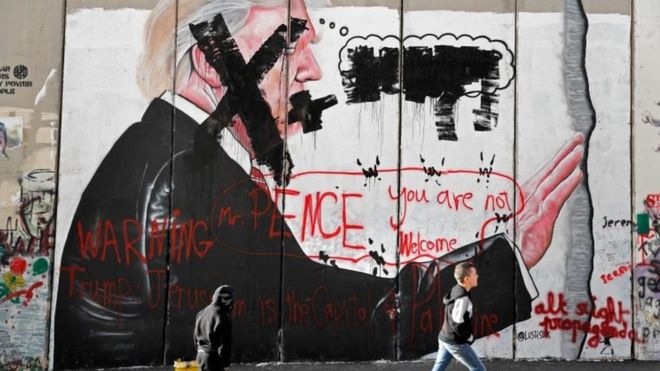 AFP/GETTY IMAGES
AFP/GETTY IMAGES
The US has warned Palestinians against cancelling talks with Vice-President Mike Pence, after Washington recognised Jerusalem as Israel's capital.
It would be "counterproductive" to scrap talks between Mr Pence and Palestinian President Mahmoud Abbas planned later this month, the US said.
A senior Palestinian official earlier said Mr Pence would not be welcome.
President Donald Trump's announcement on Jerusalem this week reversed decades of US policy on Jerusalem's status.

On Thursday, at least 31 Palestinians were wounded in clashes in the Gaza Strip and across the occupied West Bank.
The clashes were triggered by Mr Trump's policy shift. More protests are expected in Palestinian territories on Friday.
The Palestinian Islamist group Hamas has already called for a new intifada, or uprising.
Israel has deployed hundreds of extra troops in the West Bank.
Many of Washington's closest allies have said they disagree with the US policy shift, and both the UN Security Council and the Arab League will meet in the coming days to decide their response.
How did a row about the Abbas-Pence talks develop?
On Thursday, the White House said the vice-president planned to hold the meeting as planned.
Mr Pence "still intends to meet Mr Abbas and Palestinian leaders and thinks any decision to pull out of the meeting would be counterproductive," a White House official said.
During his visit - scheduled for the second half of December - Mr Pence will also visit Israel and Egypt.
Earlier in the day, Jibril Rajoub, a senior official in Mr Abbas' Fatah party, said Mr Pence was "not welcome" in the Palestinian territories.
Mr Rajoub added that the meeting with the Palestinian leader would not take place.
Mr Abbas has not personally commented on the issue.
Why did Trump reverse US policy?
Mr Trump announced the move on Wednesday. The US president said: "I've judged this course of action to be in the best interests of the United States of America and the pursuit of peace between Israel and the Palestinians."
He said he was directing the US state department to begin preparations to move the US embassy from Tel Aviv to Jerusalem.
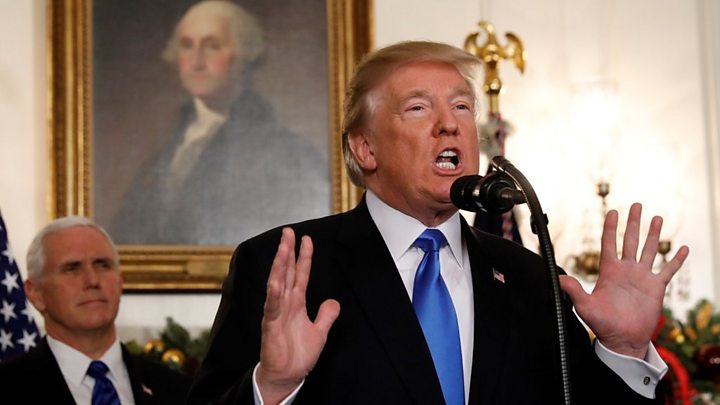
Despite warnings of regional unrest over any such move, the decision fulfils a campaign promise and appeals to Mr Trump's right-wing base.
Recognising Jerusalem as Israel's capital was "nothing more or less than a recognition of reality", he added. "It is also the right thing to do."
- Trump's speech in full
- Media reacts to 'slap of the century'
- Five key takeaways from speech
- How are capital cities chosen?
Mr Trump said the US would support a two-state solution - shorthand for a final settlement that would see the creation of an independent Palestinian state within pre-1967 ceasefire lines in the West Bank, Gaza Strip and East Jerusalem, living peacefully alongside Israel - "if agreed to by both sides".
The president also refrained from using Israel's description of Jerusalem as its "eternal and undivided capital". The Palestinians want East Jerusalem to be the capital of any future Palestinian state.
What has been the reaction?
Israeli Prime Minister Benjamin Netanyahu said Israel was profoundly grateful to Mr Trump, who had "bound himself forever with the history of the capital".
He also said Israel was "in touch with other countries to follow suit". He did not name any of these countries, although the Philippines and the Czech Republic have been mentioned in Israeli media.
The White House said it was not aware of any countries planning to follow Mr Trump's lead.
The mood has been very different on the Palestinian side.
The leader of Hamas, which dominates the Gaza Strip, has called for a "day of rage" on Friday and said it should "be the first day of the intifada against the occupier".
Hamas members would be "fully ready" to "confront this strategic danger", Ismail Haniya said in a speech in Gaza.
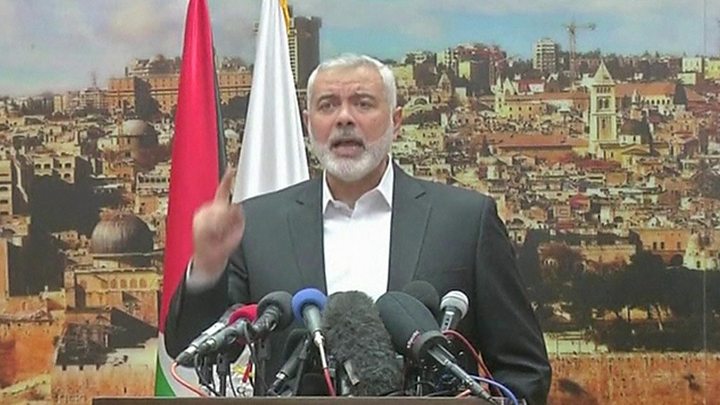
Meanwhile, the Fatah party is seeking to protest through diplomatic means, by filing a complaint to the UN Security Council and pushing for a strong stance by the Arab League.
"We are going to declare the United States disqualified as co-sponsor of any peace process or political process," spokesman Dr Nasser Al-Kidwa said. "In our mind, it has lost its ability to do or perform any efforts in this regard."
There has also been widespread condemnation across the Arab and wider Muslim world, with Turkey's President Recep Tayyip Erdogan warning Mr Trump that he was "throwing the region into a ring of fire".
The leaders of the UK, France and Germany have all said they disagree with the US announcement.
Why is the announcement significant?
Jerusalem is of huge importance to both Israel and the Palestinians. It contains sites sacred to the three major monotheistic faiths - Judaism, Islam and Christianity.
Israeli sovereignty over Jerusalem has never been recognised internationally, and all countries maintain their embassies in Tel Aviv.
East Jerusalem, which includes the Old City, was annexed by Israel after the Six Day War of 1967, but before now it has not been internationally recognised as part of Israel.
According to the 1993 Israel-Palestinian peace accords, the final status of Jerusalem is meant to be discussed in the latter stages of peace talks.
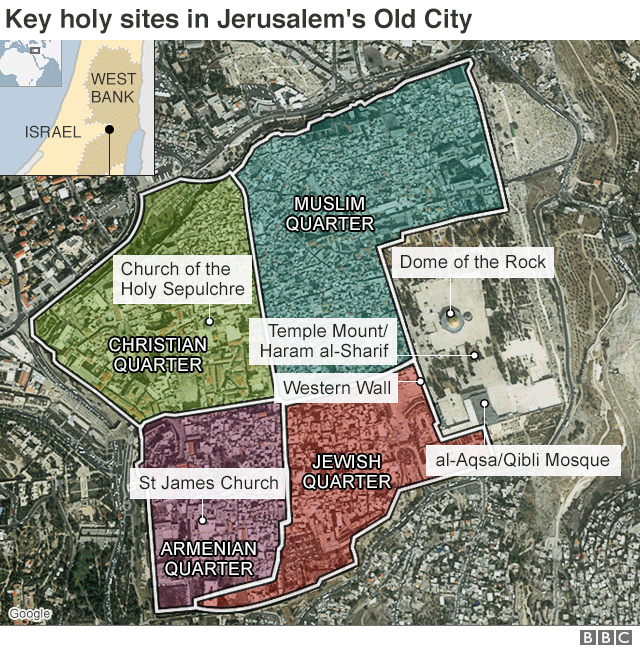

Middle East
UN rebukes Russia and Iran over Syria
- 7 December 2017
- Middle East
$450m 'Leonardo work' heads to Abu Dhabi
- 7 December 2017
- Entertainment & Arts
Italy to quiz Cambridge tutor over murder
- 7 December 2017
- Europe





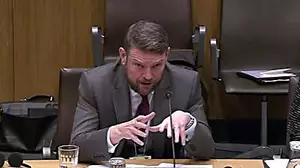




No comments:
Post a Comment